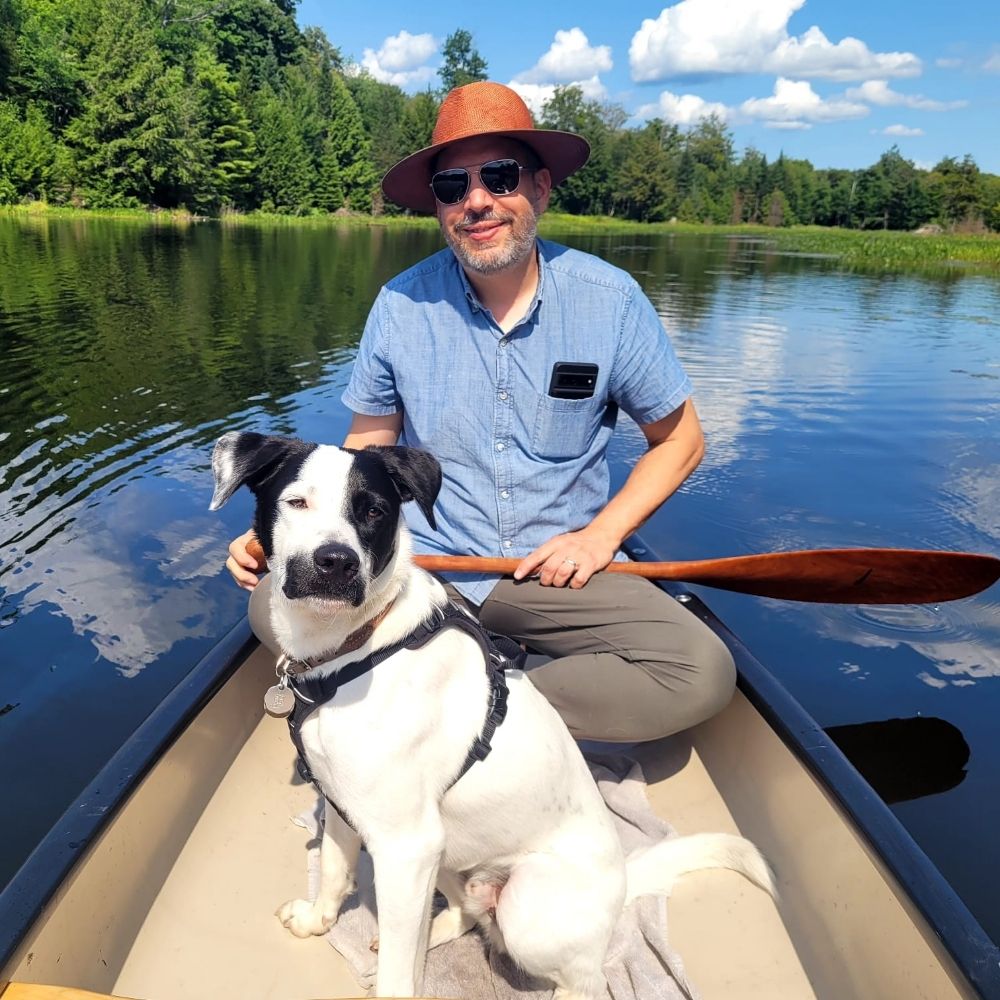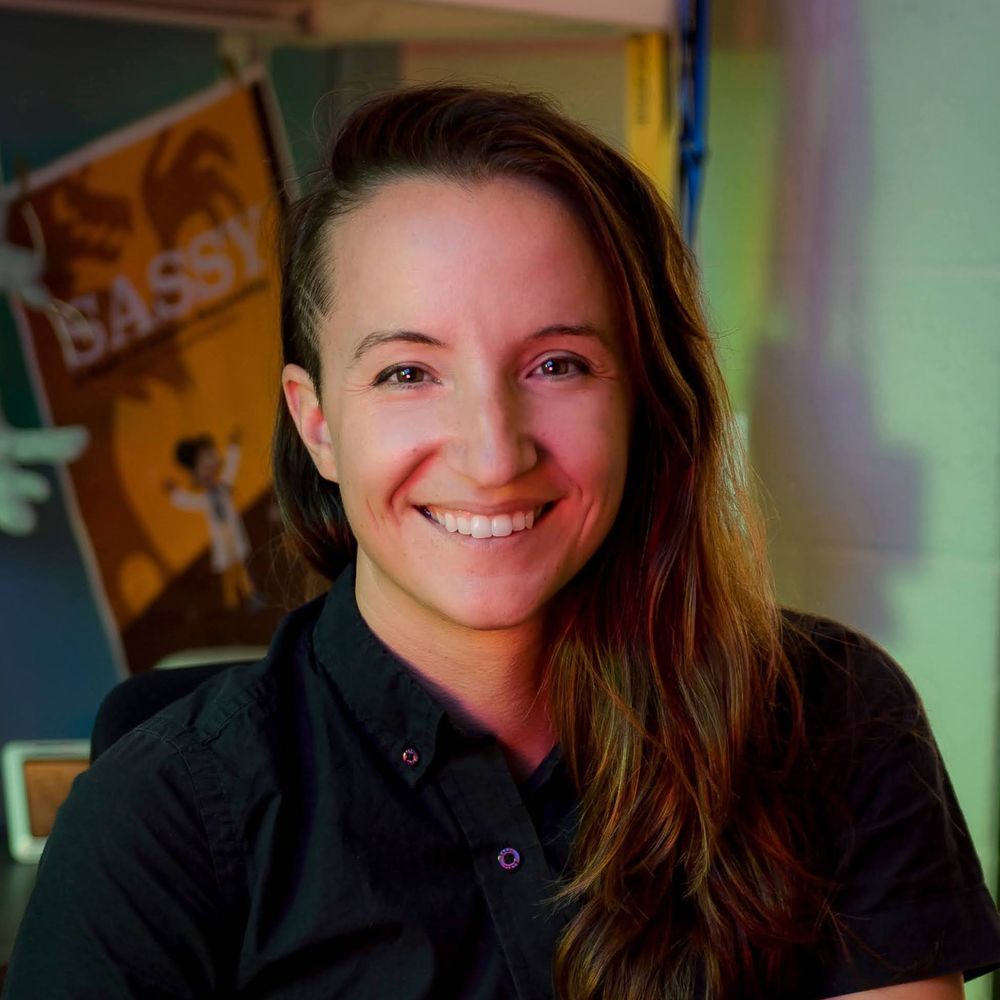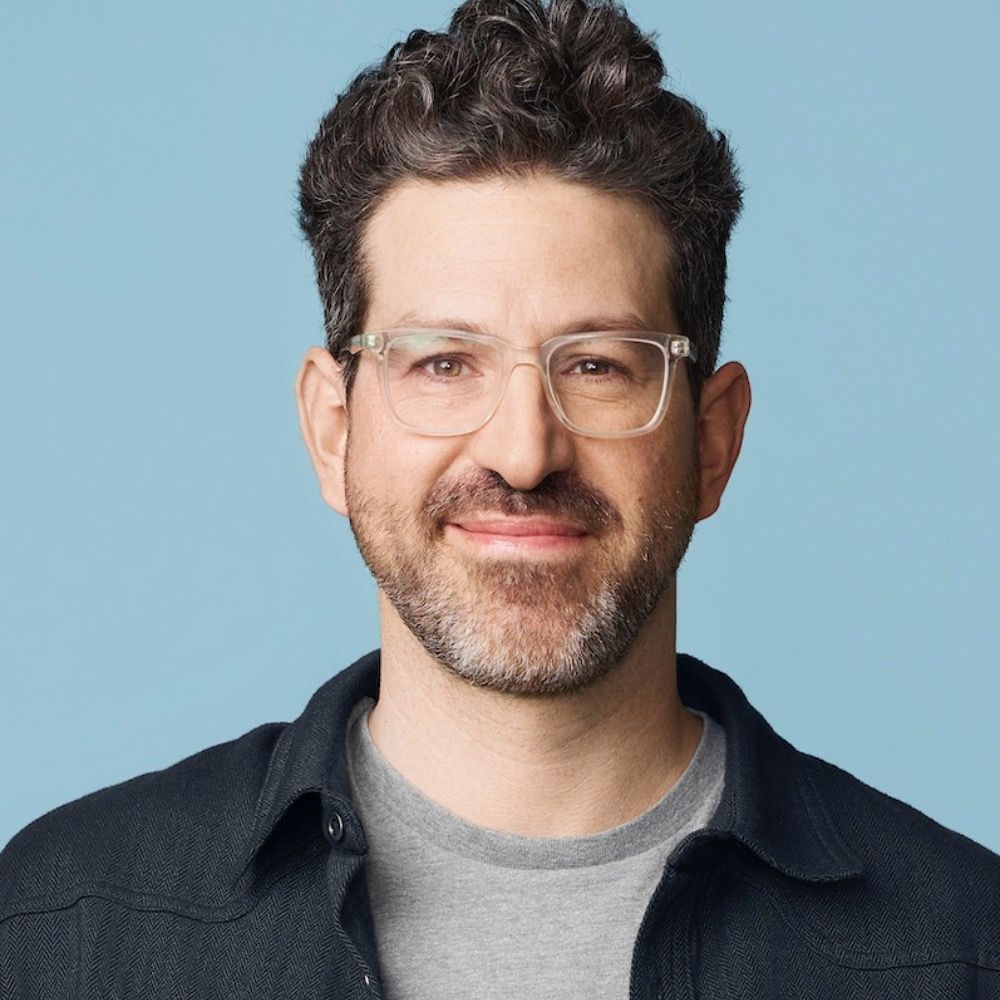

Blake Richards
@tyrellturing.bsky.social
Researcher and CIFAR Fellow, working on the intersection of machine learning and neuroscience in Montréal at @mcgill.ca and @mila-quebec.bsky.social.
created September 1, 2023
11,116 followers 3,240 following 2,486 posts
view profile on Bluesky Posts
 Blake Richards (@tyrellturing.bsky.social) reply parent
Blake Richards (@tyrellturing.bsky.social) reply parent
My guess is that the ones that will keep it going are those who's valuation is still semi-related to actual profits (Google, Meta, etc.), so I would guess something like pytorch will be maintained? But, I fully expect massively overvalued companies like OpenAI and Palantir to engage in big cuts.
 Blake Richards (@tyrellturing.bsky.social) reply parent
Blake Richards (@tyrellturing.bsky.social) reply parent
I think the *market* bubble will likely burst (the valuations of some of these companies are ridiculous), but like the dotcom bust, I don't think that market correction will actually see the end of the rapid growth of use of AI in many sectors of the economy.
 Katharine Hayhoe (@katharinehayhoe.com) reposted
Katharine Hayhoe (@katharinehayhoe.com) reposted
@nature.com I love this article - but WHY are the only share options to X and Facebook when the whole point of the article is that science-based posts get more shares here? www.nature.com/articles/d41...
 Katharine Hayhoe (@katharinehayhoe.com) reposted
Katharine Hayhoe (@katharinehayhoe.com) reposted
Positive tipping points for climate, like the UK phasing out coal, show how big steps toward a low-carbon future can suddenly become unstoppable. Can we identify where the next tipping points could happen, and figure out how to help trigger them? These researchers say YES. Read more:
 The Transmitter (@thetransmitter.bsky.social) reposted
The Transmitter (@thetransmitter.bsky.social) reposted
New findings help to explain why it has been so challenging to predict brain signaling from the connectome alone. By Holly Barker www.thetransmitter.org/connectome/w...
 Cian O'Donnell (@cianodonnell.bsky.social) reposted
Cian O'Donnell (@cianodonnell.bsky.social) reposted
incredible Ada Lovelace quote highlighted in a talk by Steve Furber. She spells out the dream of computational neuroscience, 2 centuries ago. The sheer ambition 🤩
 Jeremy Faust, MD (@jeremyfaust.bsky.social) reposted
Jeremy Faust, MD (@jeremyfaust.bsky.social) reposted
Massive walkout underway at CDC. RFK jr. must resign so that we can be safe.
 Blake Richards (@tyrellturing.bsky.social) reply parent
Blake Richards (@tyrellturing.bsky.social) reply parent
That it doesn't leave my tastebuds scarred by acid and unable to process any other flavours for the next hour. 😜
 Blake Richards (@tyrellturing.bsky.social)
Blake Richards (@tyrellturing.bsky.social)
This paper in J Neuroscience provides evidence that some of the heterogeneity in dopamine signals in the striatum is related to value decay - interesting idea, I hadn't encountered this before: www.jneurosci.org/content/45/3... 🧠📈 🧪 #NeuroAI
 Blake Richards (@tyrellturing.bsky.social) reply parent
Blake Richards (@tyrellturing.bsky.social) reply parent
Indeed, I think this is the correct answer. Basically, the markets are interpreting this as mostly theatre where the probability of true loss of independence are small.
 The Transmitter (@thetransmitter.bsky.social) reposted
The Transmitter (@thetransmitter.bsky.social) reposted
In the latest episode of @braininspired.bsky.social, Xaq Pitkow discusses how evolution's messy constraints shape optimal brain algorithms, from Bayesian inference to ecological affordances. #neuroskyence www.thetransmitter.org/brain-inspir...
 BWJones (@bwjones.bsky.social) reposted
BWJones (@bwjones.bsky.social) reposted
Bluesky is now the platform of choice for the scientific community. From @jenlucpiquant.bsky.social on @arstechnica.com arstechnica.com/science/2025...
 Michael Hendricks 🇨🇦 (@michaelhendricks.bsky.social) reposted
Michael Hendricks 🇨🇦 (@michaelhendricks.bsky.social) reposted
Hard to overemphasize how much people who live in Montreal now habitually congregate, shop, dine, drink specifically on the streets that have been pedestrianized. Of course, suburbanites still sit in the traffic jams orbiting Costco then log on to blame their misery on downtown bike lanes.
 Ching-Lung Hsu (@hiallen72.bsky.social) reposted
Ching-Lung Hsu (@hiallen72.bsky.social) reposted
hhmi.us5.list-manage.com/track/click?...
 Blake Richards (@tyrellturing.bsky.social)
Blake Richards (@tyrellturing.bsky.social)
This paper shows that some human "gestalt" style visual processing can emerge in purely feedforward deep nets with the right inductive biases and fine-tuning: journals.plos.org/ploscompbiol... 🧠📈 🧪 #NeuroAI
 Grace (@gracekind.net) reposted
Grace (@gracekind.net) reposted
Bluesky’s gonna make me take the “we don’t know if its conscious” side of this debate isn’t it
 Blake Richards (@tyrellturing.bsky.social) reply parent
Blake Richards (@tyrellturing.bsky.social) reply parent
Great thread, spot on. I fully agree: We can't really know, so that's the only really correct answer. But, we can say that, unlike a chair, LLMs exhibit behaviours that often lead us to infer consciousness in other agents, so it's not quite as easy to say "it's almost assuredly not conscious".
 Pynapple (@pynapple.bsky.social) reposted
Pynapple (@pynapple.bsky.social) reposted
New workshop! Just before SFN, join the Flatiron Institute Center for Computational Neuroscience of the Simons Foundation for a workshop on pynapple and NeMoS. Learn how to use these open-source packages to analyze and model neural data! Accommodation & meals provided. Link ⬇️
 Mark Histed (@markhisted.org) reposted
Mark Histed (@markhisted.org) reposted
As a DC resident I feel like I should say: This is a complete and utter lie. My kid, under age 12, walked to school last year into an area close to downtown. Telling the truth is an important thing.
 Blake Richards (@tyrellturing.bsky.social) reply parent
Blake Richards (@tyrellturing.bsky.social) reply parent
💯
 Blake Richards (@tyrellturing.bsky.social) reply parent
Blake Richards (@tyrellturing.bsky.social) reply parent
Yes, I 100% agree! It will require a big mind shift from the 20th century paradigm of how we use computing in business.
 Blake Richards (@tyrellturing.bsky.social) reply parent
Blake Richards (@tyrellturing.bsky.social) reply parent
I'm willing to bet that generative AI will be the same - most companies won't adopt it for a while because it won't actually make sense given how they currently work. But, that's not because it doesn't work - it's because it will only become useful after certain shifts in the economy.
 Blake Richards (@tyrellturing.bsky.social) reply parent
Blake Richards (@tyrellturing.bsky.social) reply parent
As a result, tractors only got widely adopted when society was fully industrialized and farms shifted from being the thing that the average person did on a small plot of land to something done on huge plots of land where ploughing and seeding needed to be mechanized.
 Blake Richards (@tyrellturing.bsky.social) reply parent
Blake Richards (@tyrellturing.bsky.social) reply parent
I like to use the analogy with the tractor: Tractors existed for decades before farmers started using them widely. Why? Was it because tractors were just pure hype? No, of course not. Rather, tractors only made sense with huge, industrial-scale farms, not small family holdings.
 Blake Richards (@tyrellturing.bsky.social)
Blake Richards (@tyrellturing.bsky.social)
I've gotta comment on this: A lot of people on BlueSkyhere think this is evidence that generative AI isn't useful, but that's not necessarily the correct conclusion, IMO. What this may tell us is that generative AI is not something you can just add onto existing company systems as is. #MLSky
 Blake Richards (@tyrellturing.bsky.social) reply parent
Blake Richards (@tyrellturing.bsky.social) reply parent
But note: We don´t need a definition of "alive" to make progress in biology, indeed, we've been operating without one for the entirety of the field's history! Which shows that the desire for a tighter/more generative definition is not always driven by scientific need.
 ashley juavinett (@analog-ashley.bsky.social) reposted
ashley juavinett (@analog-ashley.bsky.social) reposted
NWB just announced that they’re heading for a fiscal cliff next year. 😔 It feels like NWB was really just taking off in terms of data reuse — efforts like these take time and investment. If you want to help push back their cliff, reach out to @bendichter.com
 Blake Richards (@tyrellturing.bsky.social) reply parent
Blake Richards (@tyrellturing.bsky.social) reply parent
It suggests sequence prediction, if implemented in cortical circuits, is not done via cells dedicated to signalling prediction errors for arbitrary sequence prediction violations.
 Blake Richards (@tyrellturing.bsky.social) reply parent
Blake Richards (@tyrellturing.bsky.social) reply parent
I'm familiar with Block's work, and a bit Godfrey-Smith, but not Maviita's. I'll check it out. :)
 Blake Richards (@tyrellturing.bsky.social) reply parent
Blake Richards (@tyrellturing.bsky.social) reply parent
Indeed, you do! But as you will see in our commentary, I think your framing of computationalism is overly restrictive, Anil, i.e., I think many things you frame as being non-computational are readily cast in a computational light.
 Blake Richards (@tyrellturing.bsky.social) reply parent
Blake Richards (@tyrellturing.bsky.social) reply parent
Right, but then the answer obviously just hinges on: Do you believe that the category "living thing" can only be applied to entities who have a physical existence like ours?
 Blake Richards (@tyrellturing.bsky.social) reply parent
Blake Richards (@tyrellturing.bsky.social) reply parent
 Blake Richards (@tyrellturing.bsky.social) reply parent
Blake Richards (@tyrellturing.bsky.social) reply parent
I don't think "alive" is a property that exists as some sort of universal truth, its a concept we use to describe some systems. It would be up to use to decide whether this simulation meets the conditions for what we wish to call "alive", and we either could or couldn't.
 Blake Richards (@tyrellturing.bsky.social) reply parent
Blake Richards (@tyrellturing.bsky.social) reply parent
The mind, life, physics, and so on are computational systems if we want to frame them that way. I think anyone who paints "computational" as an ontological label that is true independent of us is not fully understanding the realities of how we use this concept in science (and math).
 Blake Richards (@tyrellturing.bsky.social) reply parent
Blake Richards (@tyrellturing.bsky.social) reply parent
Sorry, but I don't see the analogy... The luminiferous aether was a specific theory about the structure of the world. In contrast, computationalism is a methodological approach, a way of analyzing a system - it is not a theory about what exists in the world. (That's the core of my point.)
 Blake Richards (@tyrellturing.bsky.social) reply parent
Blake Richards (@tyrellturing.bsky.social) reply parent
Yeah, you've told me this, but I remain skeptical, as I've never found the arugments against computational functionalism to hold merit... I'll have to get you to explain to me where you see validity to these arguments over a beer sometime - it's surely too involved a discussion for social media. 🙂
 Blake Richards (@tyrellturing.bsky.social) reply parent
Blake Richards (@tyrellturing.bsky.social) reply parent
Looking forward to seeing your commentary!
 Blake Richards (@tyrellturing.bsky.social) reply parent
Blake Richards (@tyrellturing.bsky.social) reply parent
Ah, well, quite. I think some of these authors are either misguided (Searle), or misconstruing computationalism (Seth). I've actually just submitted a BBS response to Seth's latest piece that makes precisely this argument. 🙂
 Blake Richards (@tyrellturing.bsky.social) reply parent
Blake Richards (@tyrellturing.bsky.social) reply parent
Hmmm... interesting. I would say that natural selection theory is rife with teleological ideas, no?
 Blake Richards (@tyrellturing.bsky.social) reply parent
Blake Richards (@tyrellturing.bsky.social) reply parent
My point was not that other scientific disciplines also frame things in terms of computation. My point was that other disciplines are comfortable with the idea that we use a given approach/idea for its methodological, rather than philosophical, merit (e.g. natural selection isn't for metaphysics).
 Blake Richards (@tyrellturing.bsky.social) reply parent
Blake Richards (@tyrellturing.bsky.social) reply parent
💯
 Blake Richards (@tyrellturing.bsky.social) reply parent
Blake Richards (@tyrellturing.bsky.social) reply parent
But, I would argue almost all science is like that anyway, uncontroversially so. It's only in neuroscience, and maybe quantum mechanics, that people seem to think science should somehow be doing philosophers' jobs. 😜
 Blake Richards (@tyrellturing.bsky.social) reply parent
Blake Richards (@tyrellturing.bsky.social) reply parent
Very funny... 😂 But, I think it misses the mark. The computational explanations provide many useful things, including the ability to simulate the system in question! What they don't provide is an answer to is any of the philosophy of mind questions that people are interested in.
 Blake Richards (@tyrellturing.bsky.social) reply parent
Blake Richards (@tyrellturing.bsky.social) reply parent
Yeah, agreed! I personally am more comfortable with a framing along the lines of "computationally modelling" or "computational analyses" of the brain.
 Blake Richards (@tyrellturing.bsky.social) reply parent
Blake Richards (@tyrellturing.bsky.social) reply parent
What if I don't want to touch metaphysics? What if my goal when using the term "compute" is not philosophical, but practical and methodological? Then Piccinini's objections are not relevant, I would say...
 Blake Richards (@tyrellturing.bsky.social) reply parent
Blake Richards (@tyrellturing.bsky.social) reply parent
Indeed, in the article you linked, @wiringthebrain.bsky.social, I note that the following line in the abstract: "If we want to improve our understanding of both the metaphysics of mental states and the functional relations between them, we should reject these assumptions."
 Blake Richards (@tyrellturing.bsky.social) reply parent
Blake Richards (@tyrellturing.bsky.social) reply parent
So, when we talk about the brain "computing", we're highlighting the methodological and epistemic strategies we're employing to explain the system. But, we're not making some claim about the ontology or metaphysics of the brain.
 Blake Richards (@tyrellturing.bsky.social) reply parent
Blake Richards (@tyrellturing.bsky.social) reply parent
Yeah, I know many people who agree with this statement, but I don't think it's quite true. The utility of the term lies not in demarcating that which computes from that which doesn't. The utility lies in identifying the approach we take to studying the phenomenon we are labelling as "computation".
 Blake Richards (@tyrellturing.bsky.social) reply parent
Blake Richards (@tyrellturing.bsky.social) reply parent
Yeah, TBH, I don't even really know what "non-computational functionalism" means, @wiringthebrain.bsky.social... 😅 tl;dr: Dynamical systems are a form of computation!!!
 Ann Kennedy (@antihebbiann.bsky.social) reposted
Ann Kennedy (@antihebbiann.bsky.social) reposted
I wrote a Comment on neurotheory, and now you can read it! Some thoughts on where neurotheory has and has not taken root within the neuroscience community, how it has shaped those subfields, and where we theorists might look next for fresh adventures. www.nature.com/articles/s41...
 Blake Richards (@tyrellturing.bsky.social) reply parent
Blake Richards (@tyrellturing.bsky.social) reply parent
It gets even more pathetic for Windows when you put Linux in the mix for comparisons: Mac: things work out of the box but it costs lots of money Linux: nothing works at first but its free Windows: nothing works at first and it costs lots of money
 Blake Richards (@tyrellturing.bsky.social)
Blake Richards (@tyrellturing.bsky.social)
This is really funny…
 Blake Richards (@tyrellturing.bsky.social) reply parent
Blake Richards (@tyrellturing.bsky.social) reply parent
I want the robots to do my email so bad....
 Dane Carnegie Malenfant (@dvnxmvlhdf5.bsky.social) reposted
Dane Carnegie Malenfant (@dvnxmvlhdf5.bsky.social) reposted
I am presenting this work at the @cocomarl-workshop.bsky.social part of @rl-conference.bsky.social Tuesday (: I additionally have a generalized correction term for n-arbitrary agents (it is like walking a tree for the order of gradients) that I am looking for thoughts, validations or critiques.
 Blake Richards (@tyrellturing.bsky.social) reply parent
Blake Richards (@tyrellturing.bsky.social) reply parent
 Dan Goodman (@neuralreckoning.bsky.social) reposted
Dan Goodman (@neuralreckoning.bsky.social) reposted
I think it's probably worth remembering that tech company CEOs say a lot of nonsense because it gets media attention which helps them get investment. Your mockery helps them. Their actual business plan is not to ask AGI for a business plan, but something like to get access to data and sell it.
 Blake Richards (@tyrellturing.bsky.social) reply parent
Blake Richards (@tyrellturing.bsky.social) reply parent
Oof, that sucks…
 Blake Richards (@tyrellturing.bsky.social) reply parent
Blake Richards (@tyrellturing.bsky.social) reply parent
I don’t think this necessarily represents a total abandonment of that position (I know of projects at Google that are aligned with climate goals). But, it does illustrate that executives are willing to verbally kowtow to Trump officials when they think it will be beneficial. 😑
 Blake Richards (@tyrellturing.bsky.social) reply parent
Blake Richards (@tyrellturing.bsky.social) reply parent
I would say: a property that can only be predicted by equations at the systems-level, rather than via equations at the constituent parts level.
 Guillaume Lajoie (@glajoie.bsky.social) reposted
Guillaume Lajoie (@glajoie.bsky.social) reposted
Compositionality is a central desideratum for intelligent systems...but it's a fuzzy concept and difficult to quantify. In this blog post, lab member @ericelmoznino.bsky.social outlines ideas toward formalizing it & surveys recent work. A must-read for interested researchers in AI and Neuro
 Grace Lindsay (@neurograce.bsky.social) reposted
Grace Lindsay (@neurograce.bsky.social) reposted
The current administration loves to talk about AI, and hates to publicly fund science. But look at this latest big AI model out of Google: it's chockfull of publicly-funded datasets. You simply can't have one without the other.
 David Shiffman, Ph.D. 🦈 (@whysharksmatter.bsky.social) reposted
David Shiffman, Ph.D. 🦈 (@whysharksmatter.bsky.social) reposted
Hey everybody! @drjuliawester.bsky.social and I have a new paper! We surveyed over 800 scientists, science communicators, and science educators who use social media. Conclusion: Scientists no longer find Twitter useful or pleasant, and many have switched to Bluesky! 🧪🌎🦑 doi.org/10.1093/icb/...
 Magdalena Solyga (@solygamagda.bsky.social) reposted
Magdalena Solyga (@solygamagda.bsky.social) reposted
A new preprint from our lab with @zelechowski.bsky.social & @georgkeller.bsky.social ! Using wireless EEG + VR, we recorded visuomotor mismatch responses in freely moving humans. Huge thanks to all participants, Keller Lab members and FMI facilities! Read more: www.biorxiv.org/content/10.1...
 Blake Richards (@tyrellturing.bsky.social) reply parent
Blake Richards (@tyrellturing.bsky.social) reply parent
I think this relates to the underlying philosophy implicitly expressed by the methodologies. When you're used to studying equations of interacting units, emergence is a key, obvious idea. When you're used to trying to break everything down to the molecular mechanisms, it seems radical.
 Blake Richards (@tyrellturing.bsky.social)
Blake Richards (@tyrellturing.bsky.social)
Interesting thread here. When "emergence" is discussed in neuroscience, I find the most salient predictor of people's perspectives is their training. Computational people are often like, "Emergence? Of course, no shit." Biologists in contrast seem to often view this as a novel stance. 🧠📈 🧪
 Blake Richards (@tyrellturing.bsky.social) reply parent
Blake Richards (@tyrellturing.bsky.social) reply parent
Yeah, I see where you're going, but I would argue a good LLM is more like a sous-chef: it does a lot more than help you with one function (heating things up), its more like an extra pair of hands. If you're using an LLM like a microwave you're doing it wrong. 😜
 Blake Richards (@tyrellturing.bsky.social) reply parent
Blake Richards (@tyrellturing.bsky.social) reply parent
+1 Emergence in the sense of a system not being predictable/knowable simply from the constituent parts is a solid idea that helps explain a lot of complex natural phenomena. Emergence as an extra layer of ontology separate from the lower layer is essentially religion dressed in scientific disguise.
 Blake Richards (@tyrellturing.bsky.social) reply parent
Blake Richards (@tyrellturing.bsky.social) reply parent
Me too. I see a lot of hidden magical thinking in many of the discussions in these areas, both on emergence and consciousness.
 Blake Richards (@tyrellturing.bsky.social) reply parent
Blake Richards (@tyrellturing.bsky.social) reply parent
Blaise Aguera y Arcas and I have submitted a commentary on that BBS piece. tl;dr: I think Anil's theory is actually computational, he just doesn't want to admit it. Alternatively, he is appealing to bio-magic (which I will give him the benefit of the doubt that he's not).
 Blake Richards (@tyrellturing.bsky.social) reply parent
Blake Richards (@tyrellturing.bsky.social) reply parent
Well, on that we agree - AI in kitchen appliances is fucking ridiculous.
 Blake Richards (@tyrellturing.bsky.social) reply parent
Blake Richards (@tyrellturing.bsky.social) reply parent
I see what you're saying, but honestly, I don't agree... I already use LLMs more than I use microwaves, and unlike microwaves, they're getting better at a clip.
 Sam Gershman (@gershbrain.bsky.social) reposted
Sam Gershman (@gershbrain.bsky.social) reposted
If you work on artificial or natural intelligence and are finishing your PhD, consider applying for a Kempner research fellowship at Harvard: kempnerinstitute.harvard.edu/kempner-inst...
 Surya Ganguli (@suryaganguli.bsky.social) reposted
Surya Ganguli (@suryaganguli.bsky.social) reposted
Very excited to lead this new @simonsfoundation.org collaboration on the physics of learning and neural computation to develop powerful tools from physics, math, CS, stats, neuro and more to elucidate the scientific principles underlying AI. See our website for more: www.physicsoflearning.org
 Michael Hendricks 🇨🇦 (@michaelhendricks.bsky.social) reposted
Michael Hendricks 🇨🇦 (@michaelhendricks.bsky.social) reposted
Cycling infrastructure takes up 2% of street space in Montreal, but represents 100% of the diaper budget of crybaby drivers. www.mcgill.ca/newsroom/cha...
 Antonino Greco (@agreco.bsky.social) reposted
Antonino Greco (@agreco.bsky.social) reposted
Are top-down feedback connections enough for robust vision? We found ConvRNN with top-down feedback exhibiting OOD robustness only when trained with dropout, revealing a dual mechanism for robust sensory coding with @marco-d.bsky.social, Karl Friston, Giovanni Pezzulo & @siegellab.bsky.social 🧵👇
 John Holbein (@johnholbein1.bsky.social) reposted
John Holbein (@johnholbein1.bsky.social) reposted
Climate models since the 1970s nailed it—most predicted global warming almost exactly as it happened.
 Mila - Institut québécois d'IA (@mila-quebec.bsky.social) reposted
Mila - Institut québécois d'IA (@mila-quebec.bsky.social) reposted
Meet Mila at Deep Learning Indaba 2025! Our team is excited to connect with you at this year’s event! Drop by our booth to meet our students, exchange ideas, and dive into the groundbreaking projects we’re bringing to life.
 Mila - Institut québécois d'IA (@mila-quebec.bsky.social) reposted
Mila - Institut québécois d'IA (@mila-quebec.bsky.social) reposted
Venez rencontrer la délégation Mila à Deep Learning Indaba 2025! Passez à notre kiosque pour échanger avec nos étudiant·e·s, partager vos idées et découvrir les projets novateurs que nous développons.
 Existential Comics (@existentialcomics.com) reposted
Existential Comics (@existentialcomics.com) reposted
William James and the Train Robbery - existentialcomics.com/comic/616
 The Transmitter (@thetransmitter.bsky.social) reposted
The Transmitter (@thetransmitter.bsky.social) reposted
An explosion in open-neuroscience datasets has created a new generation of researchers with expertise in data science. But new restrictions put our research programs in jeopardy, writes Elvisha Dhamala @elvisha.bsky.social. #neuroskyence www.thetransmitter.org/open-neurosc...
 Blake Richards (@tyrellturing.bsky.social) reply parent
Blake Richards (@tyrellturing.bsky.social) reply parent
Agreed - people who want to really protect their short-term future should go get trained in the trades!
 Blake Richards (@tyrellturing.bsky.social) reply parent
Blake Richards (@tyrellturing.bsky.social) reply parent
Oh, sadly, Ford already made that clear for Ontarians...
 Diana Tamir (@dianatamir.bsky.social) reposted
Diana Tamir (@dianatamir.bsky.social) reposted
Come be my colleague! The Department of Psychology at Princeton and @princetonneuro.bsky.social are jointly searching for an Assistant Prof in Cog Neuro. puwebp.princeton.edu/AcadHire/app...
 Blake Richards (@tyrellturing.bsky.social) reply parent
Blake Richards (@tyrellturing.bsky.social) reply parent
My guess: eventually, new jobs will be found that take advantage of the fact that all these people no longer have to do menial pattern-matching. So, the long-term may not be so scary. But, yeah, the short-term may be pretty fucked for many if there aren't appropriate social saftey nets... 😑
 Ted Satterthwaite (@ted-satterthwaite.bsky.social) reposted
Ted Satterthwaite (@ted-satterthwaite.bsky.social) reposted
Just delighted to see this out in the world !! This is the first installment of SYPRES -- our living meta-analysis + open data resource focused on psychedelics. Led by the incomparable @parkersingleton.bsky.social and @bsevchik.bsky.social. Check it out + and give us your feedback!!!
 Blake Richards (@tyrellturing.bsky.social) reply parent
Blake Richards (@tyrellturing.bsky.social) reply parent
Wouldn't that depend on the specifics of the cost/difficulty of the intervention? Like, hypothetically, suppose that PSA screening cost pennies and could be done by yourself at home. Wouldn't it be good to have everyone with a potential genetic risk do it, even though it was useless for many?
 Blake Richards (@tyrellturing.bsky.social) reply parent
Blake Richards (@tyrellturing.bsky.social) reply parent
Sure, but it wouldn't be totally useless if I was, say, a policy-maker making decisions that would be implemented for millions of individuals.
 Blake Richards (@tyrellturing.bsky.social) reply parent
Blake Richards (@tyrellturing.bsky.social) reply parent
Yeah, that wasn't my quesiton. I understand the point that for a specific sample the differences may be due almost entirely to the environment. My point was that we can make inferences about what it will be for individual samples *on average*.
 Blake Richards (@tyrellturing.bsky.social) reply parent
Blake Richards (@tyrellturing.bsky.social) reply parent
No, I think it's correct... Your example of malnourishment is also correct, but that doesn't counter what I said. For every sample where it was pure environment, there would be a sample where it was pure genetics, so on average the statement would hold.
 Blake Richards (@tyrellturing.bsky.social) reply parent
Blake Richards (@tyrellturing.bsky.social) reply parent
It can on average!
 Armine Yalnizyan (@armineyalnizyan.bsky.social) reposted
Armine Yalnizyan (@armineyalnizyan.bsky.social) reposted
En garde, Canada! None of the "deals" 47 has reached are "verifiable, enforceable, and enduring". Behaviour patterned on admiration of Putin style. "This guy lies, he habitually lies...can't cut a deal with a guy like this. He's a professional, experienced liar." Which one is Rubio talking about?
 Shahab Bakhtiari (@shahabbakht.bsky.social) reposted
Shahab Bakhtiari (@shahabbakht.bsky.social) reposted
Nice write-up on the top-performing models of Algonauts 2025 competition by @humanscotti.bsky.social paulscotti.substack.com/p/insights-f... None of the teams trained the models from scratch, mainly relied on pre-trained foundation models, and ensembling seemed to be the key ingredient. 🧠🤖
 Blake Richards (@tyrellturing.bsky.social) reply parent
Blake Richards (@tyrellturing.bsky.social) reply parent
Hodgkin & Huxley had to use a 50 m long table for their experiments... 😂
 Blake Richards (@tyrellturing.bsky.social) reply parent
Blake Richards (@tyrellturing.bsky.social) reply parent
Right, so really, the concern here is that people would do something stupid like say, "Oh, well, then, I can decide on my kids' heights at 90% precision via embryo selection." But, you could surely *bias* your kids' heights by embryo selection, given this data, no?
 Blake Richards (@tyrellturing.bsky.social) reply parent
Blake Richards (@tyrellturing.bsky.social) reply parent
Hmmm... interesting. I guess it depends on what you mean by "practically matter".
 Blake Richards (@tyrellturing.bsky.social) reply parent
Blake Richards (@tyrellturing.bsky.social) reply parent
I agree: it is wrong to infer causal stories for the individual based on population level statistics.
 Blake Richards (@tyrellturing.bsky.social) reply parent
Blake Richards (@tyrellturing.bsky.social) reply parent
Yes, 100%.
 Blake Richards (@tyrellturing.bsky.social) reply parent
Blake Richards (@tyrellturing.bsky.social) reply parent
This may actually be a frequentist versus Bayesian thing here. From a Bayesian perspective, I can say something about my confidence that something will hold for the individual samples. But, for a frequentist, I can only ever say something about how often I will get those results from the samples.
 Blake Richards (@tyrellturing.bsky.social) reply parent
Blake Richards (@tyrellturing.bsky.social) reply parent
Hmmm... I feel like there's a philosophical point of divergence here. Sure, for a given draw I can't use this to make a concrete statement, but before I make the draw, I can use the population level stats to make predictions about what I will observe for the individuals. Is that not meaningful?
 Blake Richards (@tyrellturing.bsky.social) reply parent
Blake Richards (@tyrellturing.bsky.social) reply parent
Thanks, that's super clear!
Blake Richards (@tyrellturing.bsky.social) reply parent






